
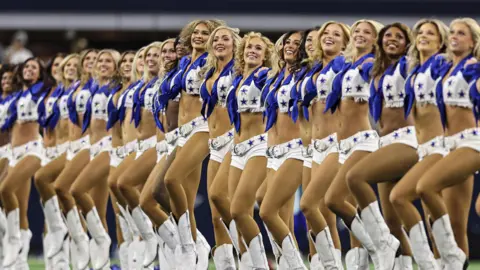 Getty Images
Getty ImagesAmerica’s Sweethearts, which lifts the lid on life in the most famous cheerleading team in the US, has been climbing up the Netflix charts since its release last month.
The series follows the gruelling recruitment and coaching process for the Dallas Cowboys Cheerleaders – DCC for short – and how much pressure the members face to be perfect.
Among the hopefuls is 24-year-old Ariana McClure – a medical sales rep who moved to Dallas to pursue her dream.
It is her second attempt at making the team, having been cut in training camp the previous year.
Dancers have to go through a tough audition process and training camp before they’re high-kicking in formation on the football pitch, all without a piece of hair or false eyelash being out of place. It’s ruthlessly competitive.
As well as learning the demanding acrobatic routines, they are required to stay the same size, so they can continue to fit in to the trademark uniform of tiny shorts, crop top and cowboy boots.
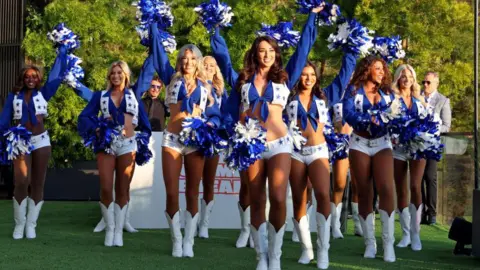 Getty Images
Getty ImagesIt’s not the first show about the cheerleaders, who are nicknamed America’s Sweethearts – there had already been 16 seasons of a reality show about the team on US network CMT.
But Netflix has brought DCC to a new audience. And many viewers have expressed shock at the demands on the cheerleaders, and the comparatively low wages they are paid.
In addition to intense training, most of the women have other full-time jobs.
In the opening episode, Cowboys boss Charlotte Jones admits the cheerleaders are “not paid a lot” – but says women on the team do not join for the pay, rather to be part of something bigger than themselves.
Ariana thinks pay has slightly improved across the board, but still says the cheerleaders should be compensated better.
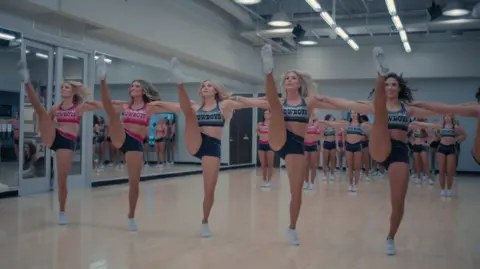 Netflix
Netflix“I definitely [don’t think we have to earn] anything near what the football players are making,” she tells the BBC.
“But I do think that these organisations have enough money.
“We like to say it’s a part-time job with a full time schedule. Apart from just the hours of practising, it’s also two hours beforehand, getting ready, you have to have your hair and make-up done.
“It’s also finding time within the day to work out so that you stay in shape, not only physically but to make sure you can get through the routines.”
She adds: “We would all ultimately do it for free because we love it and it’s our passion, but it is at the end of the day a job and they treat it as a job and so I think we should be rewarded for our work a little better – but it’s getting there.”
The series also touches on the mental health of the dancers.
Four-year veteran Victoria Kalina – who has since left the team – spoke about struggling with depression and eating disorders while she was on the team.
“I applaud Victoria for being so brave to speak about it because it’s a vulnerable thing and it’s hard to speak about that and we all have the same thoughts,” Ariana says.
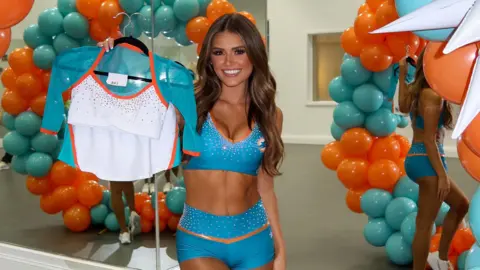 Ariana McClure
Ariana McClure In order to cope with the pressure of training, Ariana started journalling and seeing a therapist.
But she thinks, in order to help others, sports therapists should be offered to cheerleaders on NFL teams.
“My therapist was great, but she’s not a dancer, or wasn’t an athlete,” she explains. “And so having just some tools offered for the girls to talk to would be really beneficial.”
A DCC spokesperson told the BBC that all chearleaders, like its football players, have access to “immediate, independent and confidential support resources”.
“Also, just like our Cowboys players, they have access to our dedicated team Mental Health and Wellness Consultant on staff, as needed.”
‘A disturbing show’
The women featured in the series have won praise from viewers and TV critics for how they face the exacting expectations.
“America’s Sweethearts is a disturbing show on many levels, but the resilience of its women is impressive,” the Guardian said.
Emma Beddington wrote that there is “plenty to horrify” in the series, including the physical toll on the team members’ bodies, the “abysmal pay” and “the objectification”.
Time’s Judy Berman wrote: “At best, they’re athletes working at the apex of their sport; at worst, they’re casualties of a job market, a form of entertainment, and a society in which misogyny is so deeply ingrained, it’s often enforced by the women it oppresses.”
Writing in the New York Times, Jessica Grose said: “If there’s another season of the Netflix show, perhaps a more complete picture of the Cowboys cheerleading experience could force this elite institution to evolve, and it may make more of these talented women reach the conclusion that making the team isn’t worth the cost.”
Warning: Spoilers below
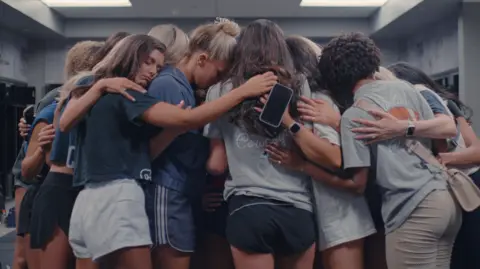 Netflix
NetflixFor Ariana, the experience ended when she was cut from training camp on the last day.
She says she only found out why she was cut from the team while watching the show “at the same time as everyone else”.
In the emotional chat with director Kelli Finglass and choreographer Judy Trammel, Ari was told she was being dropped because there were only 36 spaces, without much further explanation.
But earlier, Jones – the team’s executive vice-president and daughter of owner Jerry – had told Kelli and Judy that Ariana looked like a “little girl” and “left behind” on the team, due to her 5ft 2in (1.57m) height.
“I found out details that I didn’t know,” she tells BBC News.
“And I think it allowed for me to not so much blame myself, not be so hard on myself – knowing it’s the one thing God gave me that I can’t change or fix.”
There are no height restrictions for the team, with guidelines simply saying there are no height or weight requirements, and women are expected to “look well-proportioned in dancewear”.
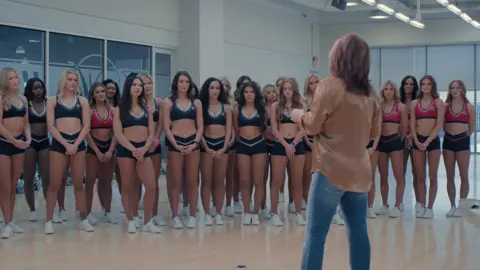 Netflix
NetflixAfter watching the show, does Ariana think there should have been a height restriction?
“Had I known even going in the first year that height was a concern, I probably wouldn’t have tried out for Cowboys again,” she says.
“I do think they need to install a height requirement.
“But I also I know that the team changes throughout the years, and the demographic of the team, and they may have more taller rookies, may have shorter rookies.”
DCC were asked by the BBC to comment on the team not having a height restriction.
But Ariana’s hard work hasn’t gone to waste – she is about to start the season as a cheerleader for the Miami Dolphins.
“It’s nice, because the new director of the Dolphins squad was at the Cowboys, and so I knew her in Dallas for a little bit.
“And so a lot of the things I loved about Cowboys in that organisation, she’s taking over to Dolphins – but it is the most mentally positive, happy environment I’ve been in.”



Be the first to comment